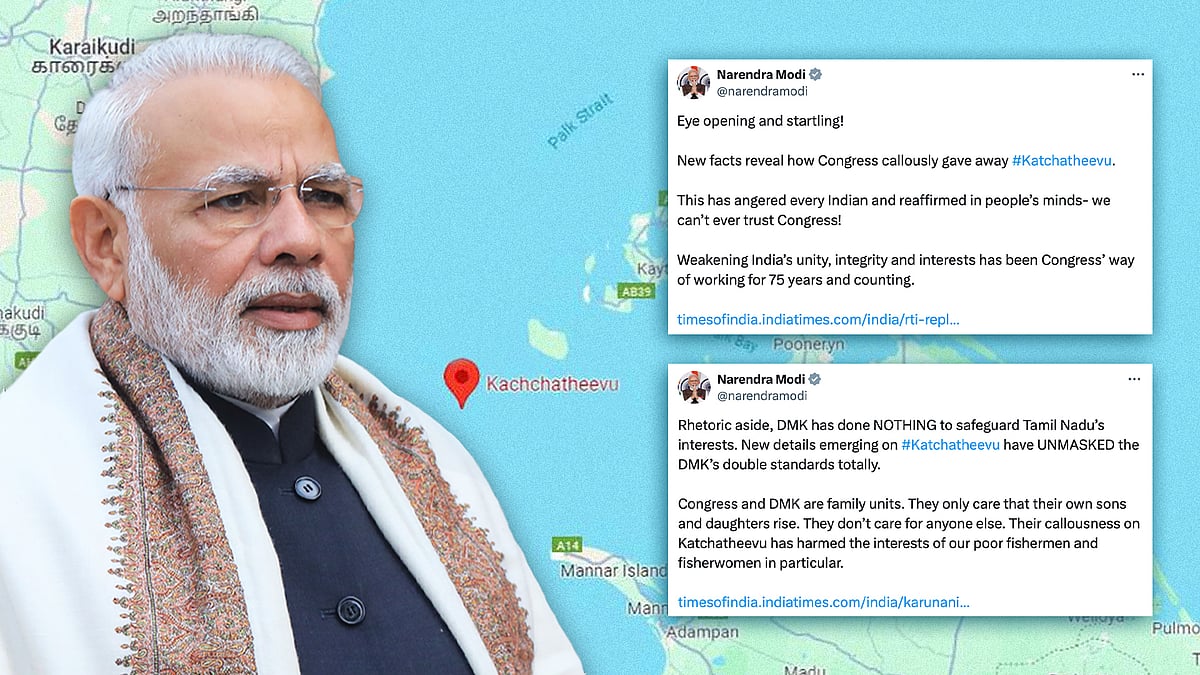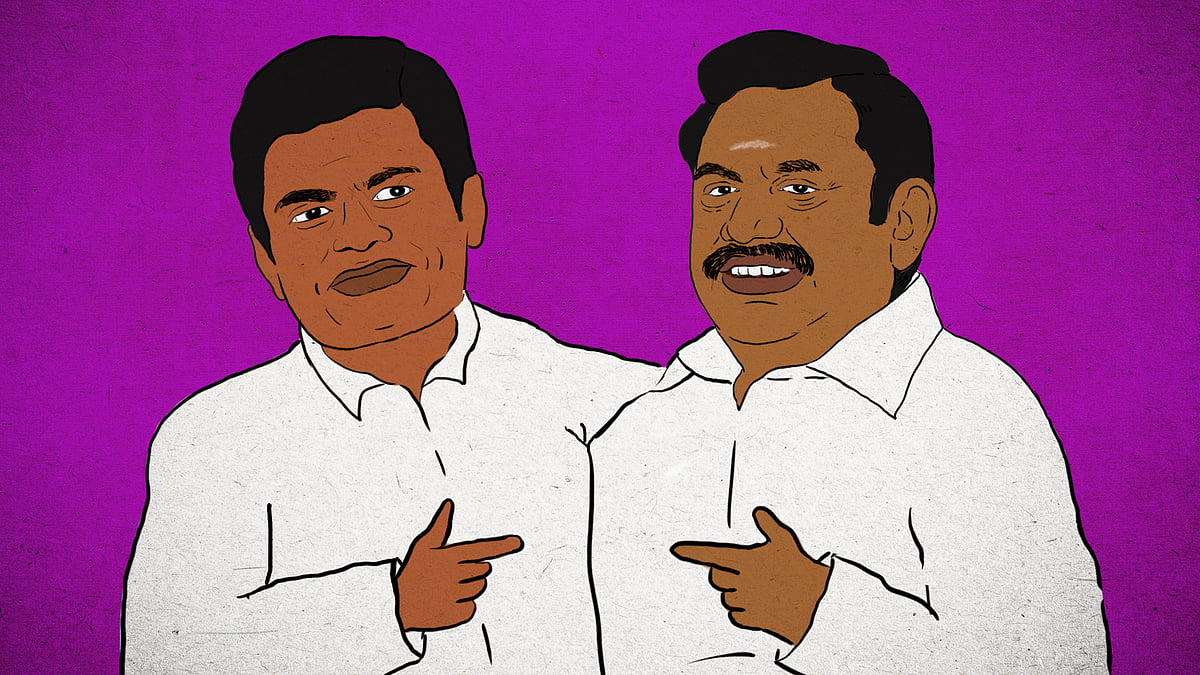Modi dreams of Dravidians: Is TN really seeing a ‘three-cornered’ fight this election?
The BJP would certainly like to think so, but all its TN outreach might still be in vain.
Tamil Nadu votes in the general elections in precisely 15 days and sections of the media might be telling you to expect a “three-cornered” contest between the DMK, AIADMK and the BJP.
The two Dravidian parties, the Tamil public, and political analysts may not quite agree with this assessment. But the BJP is desperately hoping to make inroads – one seat, any seat – and the latest to be held hostage to its Tamil Nadu dreams was Microsoft cofounder Bill Gates.
Gates met Modi in Delhi last week for, in the words of the Prime Minister’s Office, an “engaging and insightful exchange” on artificial intelligence, the G20 summit, and the NaMo app. During their 45-minute chat, Modi found time to bring up his new favourite topic – Tamil Nadu. He talked about the “affection” of the state’s people for the Kashi Tamil Sangamam, which the DMK has said the central government neither consulted with nor invited the state government or Tamil scholars.
Tamil Nadu also figured prominently in the gifts Modi presented to Gates. Apart from tea and a pashmina shawl from Kashmir, Gates got pearls from the “pearl city” of Thoothukudi and terracotta statues from the state, part of “an ancient Indian tradition that holds a special place in Tamil Nadu”.
The only way Modi could have driven his point even further home was if he’d broken out into an impromptu Bharatanatyam recital.
The Gates interaction follows a host of attempts by the prime minister to appeal to Tamil Nadu voters. There was the Sengol during the new Parliament’s inauguration last May, a temple run through south India before the Ram Temple’s consecration in January, and a flurry of visits through February and March.
More recently, Modi chose Thanthi TV, a Chennai-based Tamil news channel, for his big pre-election interview, with the two interviewers speaking in Tamil while he replied in chaste Hindi. Thanthi TV may not be entirely aligned with the major parties in Tamil Nadu but it really set the tone for the BJP’s ambitions.
Modi got a slow-motion walk-in wearing white silk veshti and shirt. The interviewer exclaimed that he looked “so pretty” and the PM fumbled through a couple of words in Tamil. Thanthi TV, with a heavy hand, led him through ruminations on why he had such “passion” for the state “unlike most of your predecessors”, why he “connects so well” with Tamilians, his favourite Tamil food (upma), and how he made his mother proud.


Screenshots from the Thanthi TV interview.
Modi also told the beaming interviewers that the Enforcement Directorate is “independent”, people would regret making electoral bonds an issue, and that the AIADMK had “betrayed” the late J Jayalalithaa by breaking its alliance with the BJP.
The same day, the prime minister even resurrected the 50-year-old Katchatheevu issue, put to bed by the Congress government in the 1970s, as an example of the DMK and Congress’s perfidy.
The BJP clearly has a plan with its eye on the election. But with just two weeks to go, how close will Modi get to achieving his Dravidian dreams?
The quest for allies
In the last Lok Sabha polls in 2019, the BJP did not win a single seat out of Tamil Nadu’s 39 seats. Its alliance partner, the AIADMK, won one seat while the DMK won 38.
This year, its election ride, steered by state chief K Annamalai, is a lonely one. The party doesn’t have a formal vote bank and, with days to go, it’s just about cobbled together allies.
The turning point came in September 2023 when the AIADMK officially ended its alliance with the BJP, accusing Annamalai of “making unnecessary remarks about our former leaders for the past year”. It may not have been the outcome the BJP’s central leadership wanted, even though Annamalai had made noises about ending the alliance since March 2023.
Since then, it’s been a scramble for the BJP to try and find new companions.
In February, national president JP Nadda arrived in Chennai to lay the groundwork for his party’s potential alliance. The heads of only four parties – the OPS faction of the AIADMK, the Tamil Maanila Congress, the New Justice Party and the India Jananayaka Katchi – turned up to meet him at his hotel. The Amma Makkal Munnetra Kazhagam sent a representative instead of party chief TTV Dinakaran coming in person.
Speaking in Chennai later that evening, Nadda bitterly complained that the closed shops on the streets – it was a Sunday – reminded him “of the Emergency”.
Later that month, on February 26, the state BJP invited the press to a “grand induction ceremony” in Coimbatore, alleging many “former and incumbent” MLAs and MPs would “jump ship and join the BJP”. The event was scheduled to start at 6 pm. An hour later, a senior party leader was forced to announce that the event was “postponed”. It never took place.
A day later, Modi addressed a rally in Tirunelveli. Only the Tamil Maanila Congress’s GK Vasan was present.
March brought better news, with the Pattali Makkal Katchi and AMMK formally joining the BJP-led NDA. Actor Sarath Kumar also merged his All India Samathuva Makkal Katchi with the saffron party.
As of last week, the NDA will contest in all 39 seats in Tamil Nadu: the BJP in 23, the PMK in 10, the Tamil Maanila Congress in three, the AMMK in two, and one independent in the form of OPS.
Heavyweight candidates include Annamalai himself from Coimbatore, L Murugan from the Nilgiris, Tamilisai Soundararajan from Chennai South, Pon Radhakrishnan from Kanyakumari, Nainar Nagendran from Thoothukudi, and C Narasimhan from Krishnagiri.
As for the DMK and AIADMK, the BJP is their figure of fun. Last week, DMK’s Udhayanidhi Stalin and AIADMK’s EPS produced photos of each other with Modi to suggest the other’s party was engaging in “secret deals” with the BJP. The implication was, in the words of The Times of India, that “ties to BJP are a poll weakness”.
It’s an inauspicious beginning to election season.
National party, national issues
The BJP’s confidence in this general election defines its approach to Tamil Nadu. Confident of Modi returning to power for a third term, it’s hoping Tamil Nadu will also want to “sync” with the central government, which is why it’s playing the Modi card – again and again. It even launched an app called NaMo In Tamil so Modi fans in the state can follow along.
Annamalai has said that the party wants to “cross 40 percent” vote share in every Lok Sabha seat in Tamil Nadu. It’s a wildly ambitious target given its vote share in 2019 was a little over three percent, though the alliance with the PMK will bump up the NDA’s percentage.
Curiously, the state BJP state chief seems convinced that the DMK and AIADMK, unlike the BJP, are stuck on local issues during a national election.
It’s a risky approach. National parties may choose to believe that “national” issues drive votes but in a country as disparate as India, there is little or no commonality between a marginalised voter in Theni and the consecration of a temple in Ayodhya. Local issues carry weight; it’s why the DMK should worry about villages in Ennore planning to boycott the polls over the Coromandel International Limited plant.
And isn’t that why Modi invoked Katchatheevu, hoping to find that connect? Sadly, that’s unlikely to carry any electoral impact either.
That leaves the BJP’s so-called vote bank in Tamil Nadu, possibly the Brahmins, barely three percent of the population, though their votes historically also lay with the AIADMK until Jayalalithaa’s death. Additionally, the BJP’s candidate list in Tamil Nadu has no Brahmins at all; one Brahmin association admitted to feeling “a little upset and unhappy” to be so sidelined.
At the end of the day, the BJP is fighting for a state where Tamil nationalism reigns supreme. Despite Modi’s avowed passion for Tamil culture and Annamalai’s tendencies towards showboating and aggression, voters have very little connection with other state leaders from the party. The general animosity towards Governor RN Ravi, assiduously batting for the BJP, hasn’t helped either.
Perhaps Modi will have to pack away his pristine white veshti for four more years. Perhaps Annamalai will have to flag off yet another yatra, or be packed away himself in favour of new blood. But if there’s one thing we've learned from 17 general elections, it’s that there's always a chance for a surprise or two.
If you’re reading this story, you’re not seeing a single advertisement. That’s because Newslaundry powers ad-free journalism that’s truly in public interest. Support our work and subscribe today.
 What the Modi govt is not telling you about the Katchatheevu dispute
What the Modi govt is not telling you about the Katchatheevu dispute BJP-AIADMK alliance: A marriage on the rocks. Can it last till next year?
BJP-AIADMK alliance: A marriage on the rocks. Can it last till next year?NL Digest
A weekly guide to the best of our stories from our editors and reporters. Note: Skip if you're a subscriber. All subscribers get a weekly, subscriber-only newsletter by default.
